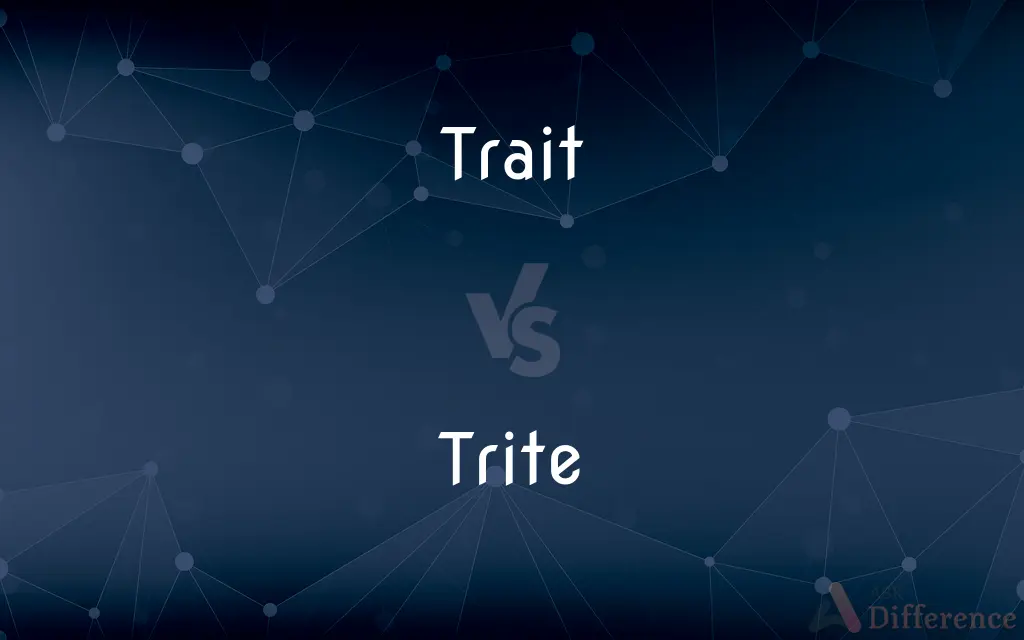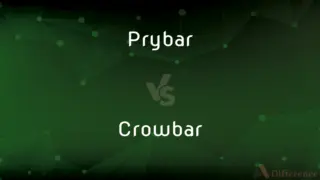Trait vs. Trite — What's the Difference?
By Tayyaba Rehman & Maham Liaqat — Updated on April 22, 2024
"Trait" refers to a distinguishing quality or characteristic, typically inherent to a person, while "trite" describes something overused and consequently lacking originality or freshness.

Difference Between Trait and Trite
Table of Contents
ADVERTISEMENT
Key Differences
A "trait" is a characteristic that can be physical, such as blue eyes, or behavioral, such as kindness. Whereas "trite" refers to expressions, ideas, or phrases that have become overused to the point of losing their original meaning or impact.
Traits are often used in psychology to describe consistent patterns in behavior, thoughts, and emotions, helping to define an individual's personality. On the other hand, trite is commonly used in literary and rhetorical criticism to describe language that lacks necessity or fails to evoke interest due to overuse.
In genetics, a trait might refer to an inherited feature or quality that can be passed down from parents to offspring. Meanwhile, trite often surfaces in discussions of cultural and artistic works, where innovation and originality are valued over repeated, stale expressions.
Describing someone’s traits can help in understanding and predicting their behavior in various situations. In contrast, using trite phrases can detract from the speaker's perceived creativity and may lead to a diminished response from the audience.
While traits contribute to the complexity of an individual's profile in both professional and personal realms, trite remarks or ideas usually simplify or undermine nuanced thinking in conversations or literary compositions.
ADVERTISEMENT
Comparison Chart
Definition
A distinguishing quality or characteristic, often inherent.
Something overused and lacking freshness or originality.
Usage in context
Psychological, genetic, personal development.
Literary criticism, everyday speech.
Impact on perception
Defines or contributes to individuality.
Diminishes originality and interest.
Relevance in communication
Essential for understanding behaviors and personality.
Often viewed negatively as it reflects lack of creativity.
Evolution over time
Can be stable or evolve with changes in environment.
Becomes more pronounced with excessive use.
Compare with Definitions
Trait
A feature that distinguishes a person or thing.
Her most noticeable trait is her unwavering honesty.
Trite
Indicates something unoriginal or stale.
The dialogue in the script was disappointingly trite.
Trait
A genetic trait can be dominant or recessive.
Having blue eyes is a recessive trait.
Trite
An expression so overused that it loses originality.
Saying at the end of the day has become trite.
Trait
A personal trait that defines individuality.
His perseverance is a trait that greatly contributes to his success.
Trite
Used to describe lackluster language in literature.
Critics dismissed his poetry as trite.
Trait
A characteristic inherited from one's parents.
He inherited his father's trait of meticulousness.
Trite
Often pertains to worn-out ideas.
The plot of the movie was trite and predictable.
Trait
A behavioral characteristic identified in psychology.
Introversion is a commonly studied trait in personality psychology.
Trite
A clichéd phrase lacking in freshness.
The phrase easy as pie is trite in contemporary writing.
Trait
A distinguishing quality or characteristic, typically one belonging to a person
The traditionally British trait of self-denigration
Trite
Trite is a genus of jumping spiders first described by Eugène Simon in 1885. Most of the 18 described species occur in Australia and New Zealand, with several spread over islands of Oceania, one species even reaching Rapa in French Polynesia.
Trait
A distinguishing feature, as of a person's character.
Trite
(of a remark or idea) lacking originality or freshness; dull on account of overuse
This point may now seem obvious and trite
Trait
A morphological, physiological, or behavioral feature of an organism.
Trite
Not evoking interest because of overuse or repetition; hackneyed.
Trait
(Archaic) A short line or mark made with a writing or drawing implement.
Trite
Often in reference to a word or phrase: used so many times that it is commonplace, or no longer interesting or effective; worn out, hackneyed.
Trait
An identifying characteristic, habit or trend.
The number one personality trait I hate is hypocrisy. Why can't you be consistent!?
Trite
(legal) So well established as to be beyond debate: trite law.
Trait
(object-oriented) An uninstantiable collection of methods that provides functionality to a class by using the class’s own interface.
Traits are somewhat between an interface and a mixin.
Trite
A denomination of coinage in ancient Greece equivalent to one third of a stater.
Trait
A stroke; a touch.
By this single trait Homer makes an essential difference between the Iliad and Odyssey.
Trite
Trite, a genus of spiders, found in Australia, New Zealand and Oceania, of the family Salticidae.
Trait
A distinguishing or marked feature; a peculiarity; as, a trait of character.
Trite
Worn out; common; used until so common as to have lost novelty and interest; hackneyed; stale; as, a trite remark; a trite subject.
Trait
A distinguishing feature of your personal nature
Trite
Repeated too often; overfamiliar through overuse;
Bromidic sermons
His remarks were trite and commonplace
Hackneyed phrases
A stock answer
Repeating threadbare jokes
Parroting some timeworn axiom
The trite metaphor `hard as nails'
Common Curiosities
Why is it important to avoid trite expressions?
To maintain interest and originality in communication.
What makes something trite?
Overuse and familiarity that lead to a lack of originality make something trite.
Can a trait become trite?
No, because traits are characteristics, whereas triteness refers to overused expressions or ideas.
How does a trait differ from a habit?
A trait is inherent and often genetic, whereas a habit is a learned behavior.
What is a trait?
A trait is a distinguishing characteristic or quality, often inherent to an individual.
Is triteness always bad?
In creative works, yes, as it indicates a lack of originality; however, it can be comforting in everyday speech.
What is an example of a physical trait?
Eye color is an example of a physical trait.
How can a writer avoid triteness?
By using original expressions and developing unique ideas.
Can triteness be subjective?
Yes, what is considered trite can vary between cultures and contexts.
How are traits useful in psychology?
They help in understanding and predicting behavior.
Share Your Discovery

Previous Comparison
Hiree vs. Hire
Next Comparison
Prybar vs. CrowbarAuthor Spotlight
Written by
Tayyaba RehmanTayyaba Rehman is a distinguished writer, currently serving as a primary contributor to askdifference.com. As a researcher in semantics and etymology, Tayyaba's passion for the complexity of languages and their distinctions has found a perfect home on the platform. Tayyaba delves into the intricacies of language, distinguishing between commonly confused words and phrases, thereby providing clarity for readers worldwide.
Co-written by
Maham Liaqat












































